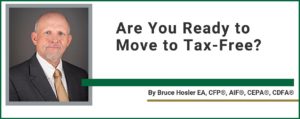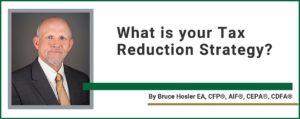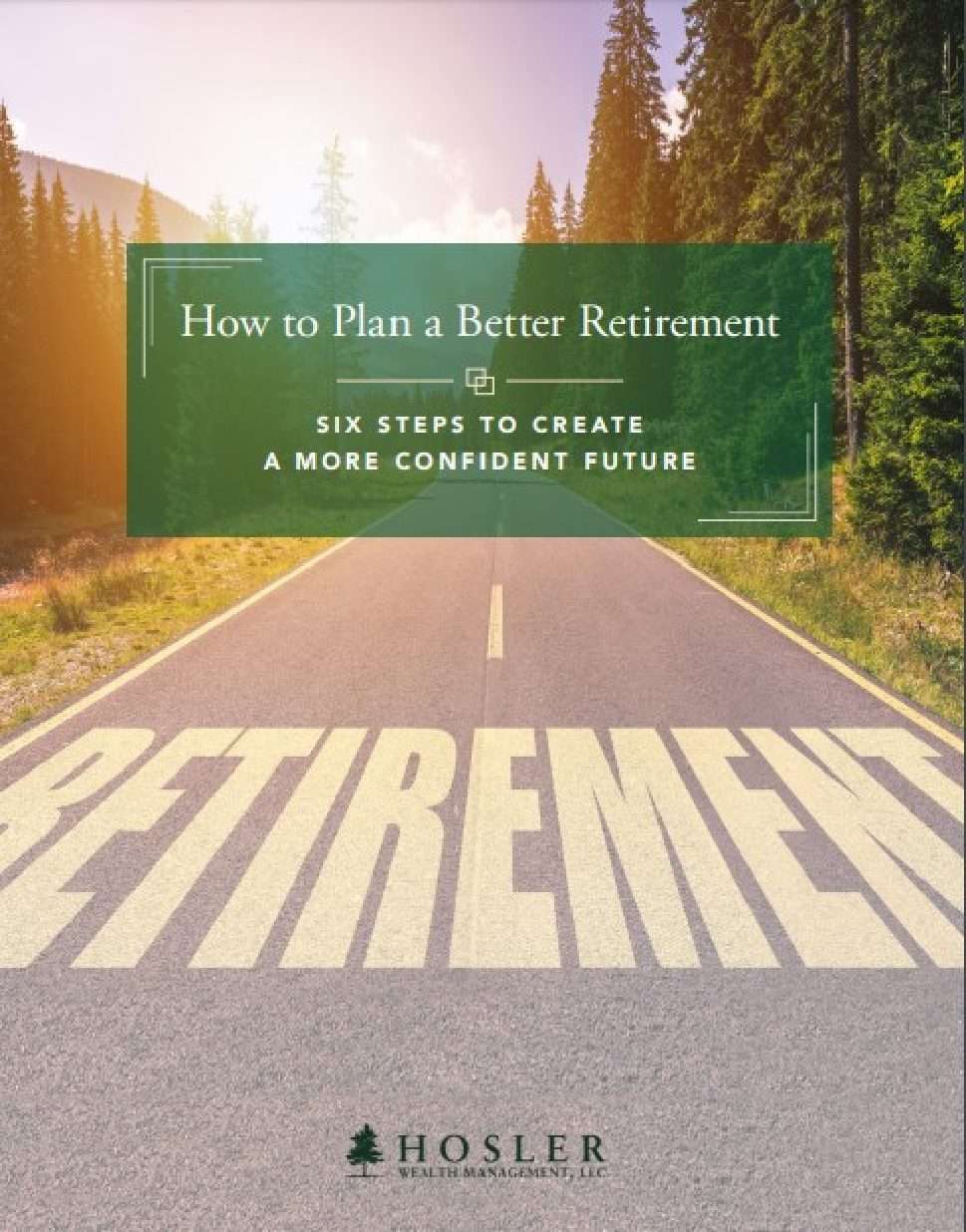A 1031 exchange refers to the section of the internal revenue code section that allows property owners to take the proceeds of a sale of real estate and reinvest those same proceeds into another property without recognizing a capital gain and without having to pay the taxes on the same. Instead, they get to defer the gains and add them to the new property.
Today, Bruce walks you through the 1031 process. It’s for use on income properties (usiually not your primary residence), and it functions similarly to an IRA rollover, but in the real estate realm.
With the recent rise in property values, a 1031 exchange might be a useful tool for many of our listeners, but it’s certainly not for everyone.
For more information about anything related to your finances, contact Bruce Hosler and the team at Hosler Wealth Management.
Call the Prescott office at (928) 778-7666 or our Scottsdale office at (480) 994-7342.
To listen to more Protecting & Preserving Wealth podcast episodes, click here.
Limitation of Liability Disclosures: https://www.hoslerwm.com/disclosures/#socialmedia
Podcast Host

Bruce Hosler is the founder and principal of Hosler Wealth Management, LLC., which has offices in Prescott and Scottsdale, Arizona. As an Enrolled Agent, CERTIFIED FINANCIAL PLANNER™ professional, and Certified Private Wealth Advisor (CPWA®), Bruce brings a multifaceted approach to advanced financial and tax planning. He is recognized as a prominent financial professional with over 27 years of experience and a seven-time consecutive *Forbes Best-In-State Wealth Advisor in Arizona. Bruce recently authored the book MOVING TO TAX-FREE™ Strategies For Creating Tax-Free Retirement Income And Tax-Free Lifetime Legacy Income For Your Children. www.movingtotaxfree.com.
In the Protecting & Preserving Wealth podcast, Bruce and his guests discuss current financial topics and provide timely answers for our listeners.
If you have a topic of interest, please let us know by emailing info@hoslerwm.com. We welcome your suggestions.
*2018-2024 Forbes Best In State Wealth Advisors, created by SHOOK Research. Presented in April 2024 based on data gathered from June 2022 to June 2023. 23,876 were considered, 8,507 advisors were recognized. Not indicative of advisor’s future performance. Your experience may vary. For more information, please visit.
Transcript
Jon “Jag” Gay: Welcome back to Protecting and Preserving Wealth. I’m Jon Jag Gay. I’m joined as always by Bruce Hosler of Hosler Wealth. Management. Good to be with you as always, Bruce.
Bruce Hosler: Jon, it’s a great day when I’m on with you.
Jon: Ah, I appreciate that. The feeling is mutual. Our 16th episode here, Bruce, we’re talking about 1031 exchanges, which are really interesting, but let’s start from the beginning, cuz I don’t have any experience with this and I think many of our listeners, it might be new for them as well. What is a 1031 exchange?
Bruce: Jon, a 1031 exchange refers to the section of the Internal Revenue code that allows property owners to take the proceeds when they sell their real estate and reinvest those same proceeds into another property, without having to recognize the capital gain and without having to pay the taxes on the sale. They get to defer the gains and they get to add them to the new property.
Jon: So, what you’re saying, Bruce is a 1031 exchange allows people to delay paying capital gains tax when they sell an appreciated piece of real estate.
Bruce: Exactly.
Jon: All right, so the 1031 exchange might help real estate owners that have highly appreciated real estate. In other words, people that have had a lot of growth and the value of their real estate, which let’s be honest, that’s everyone in the US over the last few years as we recorded this here at the end of 2022.
Bruce: Exactly, Jon. So, people that own income properties, so, so these generally mean, you know, rental or investment property, not your primary home. These people can exchange or sell the property and take the proceeds. And invest or roll them over into a new property without having to recognize the capital gain, without having to pay the tax on all that appreciation that they’ve gained over the years.
Jon: Okay. Now, I think you alluded to this exception here, my personal home, I have a lot of appreciation in the house that I’m in right now. I can’t use a 1031 exchange to delay the capital gains when I sell my home, right?
Bruce: The answer for most taxpayers is no, you cannot use a 1031 exchange on your primary home.
There is an exception to that, but only in very specific circumstances.
Jon: All right, let’s hear that exception. Who can use a 1031 exchange on their primary home?
Bruce: Well, this would have to be a seller that must meet certain 1031 requirements. So first, you have to have owned the home for two outta the last five years.
Second, you must have lived in that home as your primary residence, two outta the last five years. And third, they must have converted the old primary residence into a rental property.
Jon: Okay. So, if I understand this correctly, Bruce, if I just wanna sell my house and buy a new house with the proceeds, I can’t use a 1031 exchange for that.
Bruce: That’s correct, Jon. You’d have to keep the ownership of your old primary residence, buy a new home, and then convert your old home to a rental property.
Jon: So, people need to be able to afford to buy a new home while keeping the old home and maintaining the house payments in both the old home and the potential new home as well.
Bruce: Exactly. So you see, that’s why there’s not very many people doing a 1031 on their primary residence. It means you must have enough assets. and want to convert your old home to a rental property and still have enough funds to buy your new home without using any of the value of your old home.
Jon: Okay, so this sounds to me kind of like an IRA rollover, but for real estate, you just roll one piece of real estate over into a new one and you don’t have to pay the tax. Am I on the right track here?
Bruce: I guess you can kinda look at it that Jon, that’s pretty good. It’s a tax-deferred exchange. So, you’re exchanging one piece of real estate for a new one.
Jon: All right. And one of the big benefits that I’ve heard, uh, that real estate has is the depreciation expense.
Bruce: So depreciation or depreciation expense is a great deduction you can take on your taxes. It helps rental real estate generate great tax advantaged income cuz it shelters part of that rental income.
Jon: Okay, so we’ve talked about some of the advantages of a 1031 exchange so far, Bruce says, with all things, there’s ups and downs to everything. What are some of the downsides to a 1031 exchange?
Bruce: Well, first and foremost, all the rules in order to qualify for a 1031 can be hard to fulfill. For example, within 45 days of selling your property, you have to identify your potential new properties up to three of them. And then you have 180 days to complete the purchase of one of those properties. And you know, in this competitive real estate environment we’ve been in, sometimes somebody could buy something out from under you.
Sometimes it’s hard to qualify and fulfill that 1031 exchange requirement.
Jon: If our listeners haven’t had that happen to them directly, I’m sure they know somebody that it’s happened to. It is, uh, quite common these days.
Bruce: Yes, for certain.
Jon: And I’ve also heard Bruce, you need a qualified intermediary. What do they do?
Bruce: In order to be successful with a 1031 exchange, you need to engage what’s called a qualified intermediary, and they assist you with the proceeds of your sales. So you see, you can’t touch the money or you’re gonna blow up the 1031 exchange. So, oh, the qualified intermediary will hold the funds, the proceeds from your sale and hold onto them and guard them and use them to help you buy the new property without you ever taking possession of the money.
Jon: Okay, that makes sense. So, that you’re not, you’re not paying the taxes because the money’s not going to you. It’s being held elsewhere, enrolled into something else. That actually makes a lot of sense. The more I think about it.
Bruce: Kind of like your IRA rollover. You can’t touch the money when you roll it over. If you take possession of it, you can blow a rollover.
Jon: Okay, so a million dollar question here, Bruce, no pun intended. This makes me wonder which types of property owners are the best candidates for a 1031 exchange?
Bruce: You know, if you have income property and you’re getting tired of being a landlord, if you want to give up all the property management hassles like the “T’s” – taxes, toilets, tenants, , you might be a canidate for a 1031 exchange. Now, if you’re already retired or you’re getting ready to retire and you just want mailbox money coming in regularly, then you’re probably a good candidate for a 1031 exchange as well.
Jon: Uh, someone close to me, uh, actually just became a property owner and picked up several rental properties. I’m gonna steal that. The three “T’s” – taxes, toilets, and tenants. I like that a lot.
Bruce: Yeah, that’s great.
Jon: I’m guessing a 1031 exchange is of course not for everyone as well, right?
Bruce: Certainly, these transactions require a lot of work and commitment to see it through. Sometimes they’re not easy, but the amount of taxes that can be saved make them very worthwhile for most of our listeners.
Jon: I can see that. I heard that when owners sell properties they’ve owned for many years, the recapture of the depreciation can actually be worse than the capital gains tax.
Bruce: Oh, absolutely Jon. When we sell a property that’s been depreciated for many years, The owner must recognize the recapture of all the depreciation that they’ve claimed over the years.
The depreciation recapture tax rate is 25%, so recapturing all the depreciation and adding that on top of the capital gains, of the appreciation of the real estate over the years can turn out to be a big number.
Jon: Yeah.
Bruce: That is the primary reason why 1031 exchanges are so popular with real estate investors.
Jon: All right, so Bruce, if our listeners are contemplating making a sale of highly appreciated real estate, they may have a number of questions just based on a scratch in the surface today. Can they call you to get their questions answered?
Bruce: Certainly, these transactions have a lot of moving parts and we offer information and incite. 1031 exchange options that they haven’t considered – tax information. We can be a great resource to anybody that’s a real estate investor.
Jon: Well, hopefully you’ve wetted their whistle and opened some of our listeners eyes to this possibility if it’s the right fit for them. If listeners wanna find out more about 1031 exchanges Bruce, how do they reach you at Hosler Wealth Management?
Bruce: So you can reach us at the website at https://hoslerwm.com. We’re on the phone in Prescott at (928) 778-7660. We’re in Scottsdale (480) 994-7342.
Jon: Great information, Bruce. I learn something every time I talk to you. Take care and we’ll talk soon.
Bruce: Thanks.
Jon: Securities and advisory services offered through Commonwealth Financial Network®, member Finra/SIPC, a registered Investment advisor.
Forward looking commentary should not be misconstrued as investment or financial advice. The advisor associated with this podcast is not monitored for comments and any comments should be given directly to the office at the contact information specified. Any tax advice contained its communication, including any attachments, is not intended or written to be used and cannot be used for the purpose of 1) avoiding federal or state tax penalties, or 2) promoting marketing or recommending to another party, any transaction or matter addressed herein.
The accuracy, completeness, and timeliness of the information contained in this podcast cannot be guaranteed. Accordingly, Hosler Wealth Management LLC does not warranty guarantee or make any representations or assume any liability with regard to financial results based on the use of the information in this podcast.
Comments are closed.




